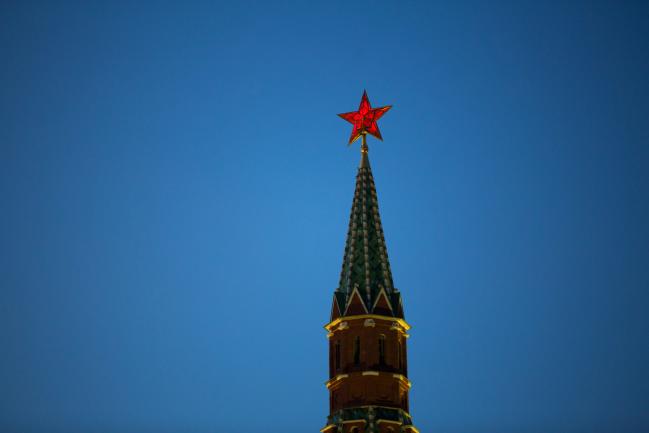(Bloomberg) -- The leading effort in Congress to deter Russia from meddling in the U.S. midterm elections is likely to be rewritten to minimize unintended effects on global economies from stiff automatic sanctions on sovereign debt and energy.
“We want to make sure that the economic harm is confined as much as possible to the Russian economy and the spillover effects are limited,” said Senator Chris Van Hollen, a Maryland Democrat.
The bill, introduced in January by Van Hollen and Florida Republican Marco Rubio, would impose the sanctions if Director of National Intelligence Dan Coats certified that Moscow is interfering in the November election in the U.S.
The proposal calls for sanctions on issues of new Russian sovereign debt, a penalty the U.S. Treasury Department warned in February could damage global financial markets, and would block certain transactions in property involving Russian energy companies, including Gazprom (MCX:GAZP) and Rosneft PJSC. It also would sanction Russian banks, mining interests and officials.
Treasury’s Warning
Treasury officials said that sanctioning Russia’s sovereign debt market would put downward pressure on Russian economic growth, increase strain on the banking sector and “lead to Russian retaliation against U.S. interests.” Foreign investors hold more than a third of Russia’s local and international sovereign bonds.
Van Hollen didn’t detail the potential changes in the measure, although he said one possibility would allow the Trump administration to waive some -- but not all -- of the sanctions based on national security grounds.
“We’re looking at a range of options and nothing has been settled,” he said. “These are the kinds of ideas that are being discussed.”
Both Republicans and Democrats in Congress have called for tough measures against Russia after President Donald Trump was seen as too conciliatory toward Russian President Vladimir Putin at their summit last month in Helsinki.
While Trump has said “nobody’s been tougher on Russia than I have,” he has continued to waver on his acceptance of the finding by U.S. intelligence agencies that Russia interfered in the 2016 presidential campaign and especially the conclusion that the goal was to help him win.
Many of the sanctions that have been imposed on Russia have been required by new or long-standing legislation passed by Congress, such as the State Department’s move this month to punish Putin’s government for the nerve-agent attack on a former spy and his daughter in the U.K.
Coats, the intelligence chief, warned this month that Russians are only a “keyboard click” away from interfering in this year’s election, saying they “are looking for every opportunity, regardless of party” to disrupt the process.
Efforts to deter such meddling have inspired a number of measures in Congress. The ruble and Russian bonds retreated this month when Russian media published the full text of a bill that Republican Senator Lindsey Graham of South Carolina sponsored with Democrat Bob Menendez of New Jersey. Graham said their measure was intended to “impose crushing sanctions and other measures against Putin’s Russia until he ceases and desists meddling in the U.S. electoral process” and withdraws from Ukraine.
The outlook for passage of the Van Hollen-Rubio bill, S. 2313, remains uncertain, although Senate Majority Leader Mitch McConnell said the chamber could take up the measure and directed the Foreign Relations and Banking committees to hold hearings.
Tweaking the legislation may help broaden its support in Congress.
Senate Foreign Relations Chairman Bob Corker of Tennessee joked to reporters Thursday that the original bill risked doing more damage to Russia than a “tactical nuclear weapon” and said he expected changes to ensure a strong bill emerges.
Hearings Tuesday
The Foreign Relations and Banking committees will hold simultaneous hearings on Russia and sanctions on Tuesday. Corker said a bill could emerge by the end of the September. That doesn’t give much time for Congress to act ahead of the November elections.
“There’s a likelihood that if we handle this right and it’s not something that’s over the top and out of control that another Russia bill could happen,” Corker said.
Corker said he’s told Van Hollen and Rubio that they have to be careful “that we don’t hurt our European friends, that we don’t hurt our own companies.”
Van Hollen said the final legislation could include two tranches of sanctions -- one that would be automatic and can’t be waived by the administration, and a second set that could be waived for national security reasons, giving Trump more flexibility.
Shadowing the negotiations is uncertainty over whether Trump would veto a measure forcing him to impose far-reaching new sanctions -- and whether the Republican-led Congress has any appetite for overriding such a veto.
Van Hollen said he’s hopeful the bill can attract large majorities in Congress, as did Russia sanctions that lawmakers approved last year.
Corker said that he and Banking Chairman Mike Crapo of Idaho are working closely and trying to craft a process that produces legislation that’s “so overwhelmingly supported that the White House wouldn’t even consider vetoing it.”
